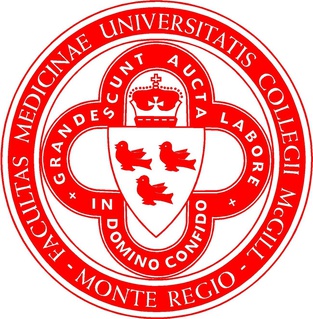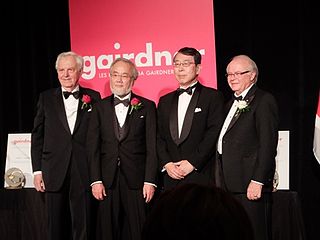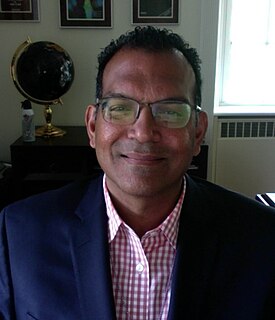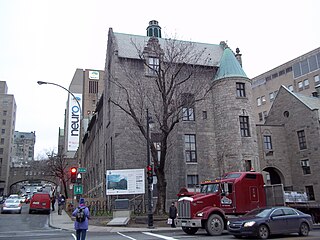Related Research Articles
Louis "Lou" Siminovitch, is a Canadian molecular biologist. He was a pioneer in human genetics, researcher into the genetic basis of muscular dystrophy and cystic fibrosis, and helped establish Ontario programs exploring genetic roots of cancer.
The Gairdner Foundation is a non-profit organization devoted to the recognition of outstanding achievements in biomedical research worldwide. It was created in 1957 by James Arthur Gairdner to recognize and reward the achievements of medical researchers whose work contributes significantly to improving the quality of human life. Since the first awards were made in 1959, the Gairdner Awards have become Canada's most prestigious medical awards, recognizing and celebrating the research of the world’s best and brightest biomedical researchers. Since 1959, more than 390 Canada Gairdner Awards have been given to scientists from 35 countries; of these recipients, 95 have subsequently gone on to win a Nobel Prize.
Herbert Henri Jasper, was a Canadian psychologist, physiologist, neurologist, and epileptologist.
William Howard Feindel, was a Canadian neurosurgeon, scientist and professor.

The Faculty of Medicine is one of the constituent faculties of McGill University. It was established in 1829 after the Montreal Medical Institution was incorporated into McGill College as the college's first faculty; it was the first medical faculty to be established in Canada. The Faculty awarded McGill's first degree, and Canada's first medical degree to William Leslie Logie in 1833.
Connie Jean Eaves, FRSC CorrFRSE, is a biologist with significant contributions to cancer and stem cell research. Eaves is a professor generics of genetics at the University of British Columbia and is also the co-founder with Allen C Eaves of Terry Fox Laboratory.
This article outlines the history of natural scientific research in Canada, including physics, astronomy, space science, geology, oceanography, chemistry, biology, and medical research. Neither the social sciences nor the formal sciences are treated here.
Adolfo J. de Bold, OC, FRSC is an Argentinian–Canadian cardiovascular researcher, best known for his discovery of atrial natriuretic peptide, a polypeptide hormone secreted by heart muscle cells.
Michel Chrétien, is a Canadian medical researcher specializing in neuroendocrinology research at the Institut de recherches cliniques de Montréal, or Clinical Research Institute of Montreal, (IRCM).
Dr. Alan Bernstein OC, OOnt, FRSC is President and CEO of CIFAR. He is recognized as a leader in health research, science policy, mentorship and organizational leadership.

Michael R. Hayden, is a Killam Professor of Medical Genetics at the University of British Columbia, the highest honour UBC can confer on any faculty member. Only 4 such awards have ever been conferred in the Faculty of Medicine. Dr. Hayden is also Canada Research Chair in Human Genetics and Molecular Medicine. Hayden is best known for his research in Huntington disease (HD).
Dr. Allan R. Ronald is a Canadian doctor and microbiologist. He has been instrumental in the investigation into sexually transmitted infections in Africa, particularly in the fields of HIV/AIDS. Ronald is the recipient of multiple awards and honours.
Doctor James C. Hogg is a Canadian physician.

Doctor John Herbert Dirks is a Canadian physician.
Peter T. Macklem (1931–2011), OC, FRCP(C), FRSC was a Canadian doctor, medical researcher and hospital administrator.
Ronald G. Worton, is a Canadian doctor.
Kameshwar Prasad is an Indian neurologist, medical researcher, academic and the head of the department of Neurology at the All India Institute of Medical Sciences, Delhi (AIIMS), known as a proponent of Evidence-based medicine (EBM) and Evidence-based Healthcare (EBHC). The Government of India awarded him the fourth highest civilian honour of the Padma Shri in 1991.

Rajiv Ratan is an Indian American academic, professor, administrator and scientist based in New York. He is the Burke Professor of Neurology and Neuroscience at Weill Cornell Medicine. Since 2003, he has served as the executive director of Burke Neurological Institute and as a member of the Council of Affiliated Deans of Weill Cornell Medicine.

The Montreal Neurological Institute-Hospital(MNI), also knows as Montreal Neuro or The Neuro, is a research and medical centre dedicated to neuroscience, training and clinical care, located in the city's downtown core of Montreal, Quebec, Canada. It is part of the McGill University Health Centre network and it is situated on the southern slope of Mount Royal along the east side of University Street, just north of Pine Avenue. It was founded in 1934 by neurosurgeon Wilder Penfield, who developed the Montreal procedure there for the treatment of epilepsy.
Olivier Beauchet is a physician, Professor of Medicine, and Joseph Kaufman Chair in Geriatric Medicine at McGill University in Montreal, Quebec, Canada. He was also appointed Director of the Centre of Excellence on Longevity at McGill University and is a senior investigator at the Lady Davis Institute for Medical Research.
References
- 1 2 3 4 5 "Dr. Antoine Hakim". Canadian Medical Hall of Fame. 2013. Archived from the original on 2014-08-19.
- 1 2 "Ottawa MD wins top award for stroke research". Ottawa Citizen. February 7, 2007.
- ↑ "From engineer to medical hero: Canadian Medical Hall of Fame laureate Dr. Antoine Hakim". University of Ottawa Gazette. July 17, 2013. Archived from the original on August 19, 2014.
- 1 2 "Network Personnel". Canadian Stroke Network. Archived from the original on 2014-07-13.
- 1 2 "Antoine M. Hakim, O.C., MD, PhD, FRCPC". Ottawa Hospital Research Institute.
- ↑ "All Gairdner Awards Laureates". Gairdner Foundation. Retrieved 2019-10-08.